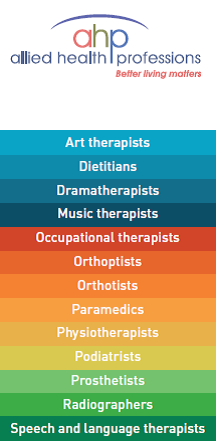Allied Health Professions
Allied Health Professions: Who we are and what we do

Allied Health Professions are a diverse workforce of thirteen different professions who deliver high-quality care to patients and service users across a wide range of settings. They play an important role in our health and social care services. This page provides a brief overview of Allied Health Professionals (AHPs) and the services they provide to the public. The pdf version of the booklet can be downloaded here.
Practical interventions from AHPs help people to recover movement and mobility, overcome visual problems, improve their nutrition, and develop communication and everyday living skills, allowing them to sustain and enjoy quality of life even when faced with life-limiting conditions. AHPs enable children and adults to make the most of their skills and abilities and to develop and maintain healthy lifestyles. They support people of all ages in their recovery, helping them to return to work and participate in sport or education.
AHPs are critical to the ongoing assessment, treatment and rehabilitation of patients throughout the illness episodes whether brief or long-lasting.
AHPs are regulated by the Health and Care Professions Council (HCPC). The HCPC exists to protect the public by maintaining a register of health professionals who meet their standards for training, professional practice, behaviour and health. All AHPs work within the HCPC code of practice to ensure that they work to the highest standard.
The professions listed below are ‘protected titles’, which means that only individuals who have been appropriately trained and are registered with the HCPC can work under these titles. You can check that your practitioner is on the HCPC register here.
Each Allied Health Profession also has its own professional body whose role is to advance the science and practice of its profession, to promote training and education and, in some instances, to act as the trade union.
Allied Health Professions (AHPs) are a diverse group of clinicians who deliver high-quality care to patients and clients across a wide range of care pathways and in a variety of different settings. They play an important role in modern health and social care services.
The AHPs within the remit of the Assistant Director are;
- Dietetics
- Occupational therapy
- Orthoptics
- Paramedics
- Physiotherapy
- Podiatry
- Radiography
- Speech and language therapy.
Practical interventions from AHPs are often significant in enabling people to recover movement and mobility, overcome visual problems, improve nutritional status, develop communication and everyday living skills, thus allowing them to sustain and enjoy quality of life even when faced with life-limiting conditions.
Regulation
The AHPs are autonomous practitioners which means they assess, diagnose, treat and discharge in their own right. They are regulated by the Health Professions Council (HPC).The HPC is in place to protect the public by maintaining a register of health professionals who meet their standards for training, professional skill, behaviour and health.
All of the AHPs have at least one professional title that is protected by law, including those shown above. This means, for example, that anyone using the titles ‘physiotherapist’ or ‘dietitian’ must be registered with the HPC. It is a criminal offence for someone to claim they are registered with the HPC when they are not, or to use protected title that they are not entitled to use (privately and within the HPSS).
If an AHP does not meet the standards of the HPC they will take action which may include striking the professional off the register.
AHP professional bodies
Each AHP has its own professional body. The role of each professional bodies is to:
- advance the science and practice of the individual profession;
- promote training and education in the science and practice of the profession; and, in some instances
- act as the trade union.
